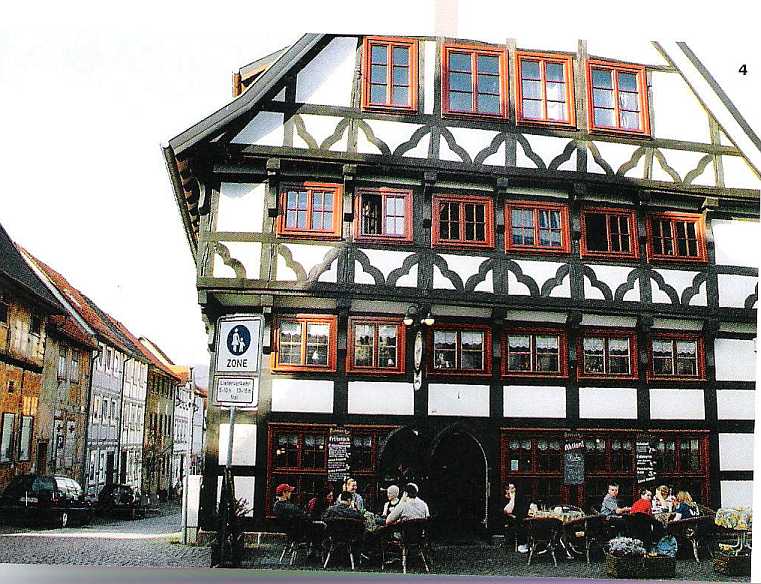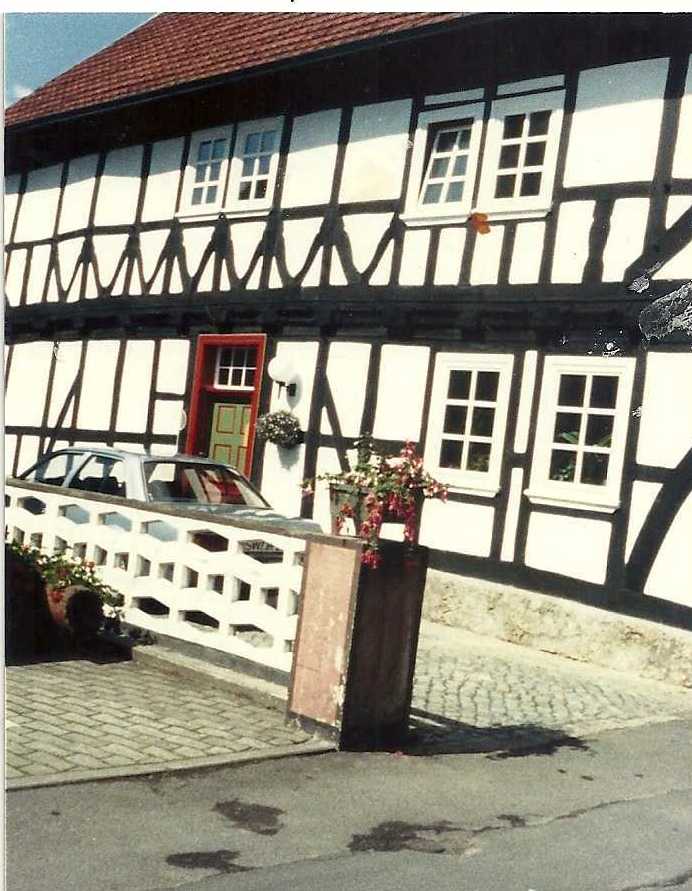A speech at a recent bris.
My father was born and raised in a small town in Germany. His family all lived in the area, and were within an hour's train ride of his home in Witzenhausen.
A recent picture of Witzenhausen

German Jewry has a reputation as the cradle of the Reform movement, but what is not well-known is that these new winds were found only in the larger cities. In the smaller towns these influences were not present. Small town German Jewry was no less authentically and deeply Jewish than the small town Jewry of the Eastern European shtetls. Generally the German communities were populated by simple people who held tightly to the faith of their fathers. Many communities had been in place for more than thousand years, much longer than the Eastern Europe communities.
My father z"l grew up in this environment.
On our extensive family tree which extends back hundreds of years, the occupation of many of our ancestors is given a Viehhaendler — pronounced fee-handler, or cattle merchant. There are probably social and economic factors that contributed to this choice, but perhaps it is not entirely coincidental that the Rambam in Moreh Nevuchim (III, 39) in explaining the reasons behind the special laws of firstborns that apply to cattle, sheep and donkeys, writes: The fact that these laws apply uniquely to cattle, sheep and donkeys is explainable. These are the domestic animals raised by people and they are found in most places. And certainly in Eretz Yisroel, and more certainly among the Jewish people. Most of us are shepherds, our fathers and the fathers of our fathers. [As the verse says:] Your servants were men of livestock (Bereishis 46:34).
It will be noted that the Rambam himself and his family were not occupied with raising livestock, yet he nonetheless describes it as a traditional Jewish occupation. I suspect that this idea forms at least part of the explanation of the fact that so many German Jews chose this occupation.
My great-grandfather's home in Abterode. He was a Viehhaendler.

I would like to describe something that I believe exemplifies the deep attachment that German Jewry had towards their mesorah. After my father z"l died, they wanted to use burial shrouds (tachrichin) that he had saved for over seventy years. Before he left Germany soon after the rise of Hitler, his mother sewed him traditional burial shrouds to carry with him on his journey through life. The local Chevra Kadisha did not know how they were draped around the body, and it took some effort to find someone who could explain to them how to do it.
These shrouds were given to my father by his mother to ensure the maintenance of the link to Jewish tradition in the unknown future in America. I believe that this means is explained by the gemora (Brochos 5a): Rav Levi bar Chama said that Resh Lakish said: One should always pit the yetzer tov against the yetzer hara, as it says, `Agitate and you will not sin.' If he overcomes his (the yetzer hara) fine. If not he should study Torah, as it says, `Say in your heart.' If he overcomes his (the yetzer hara) fine. If not he should say Shema, as it says, `On your bed.' If he overcomes his (the yetzer hara) fine. If not remind him of the dying day, as it says, `And be silent, Selah.'
From the gemora it is evident that awareness of the day of death is the ultimate weapon against the yetzer hara. American was already famous for its yetzer hara in those days, but by sending along burial shrouds that she had sewed herself, my grandmother was providing my father with the most powerful medicine there is to shield him from the yetzer hara of America.
The Human Soul
Near the beginning of our parsha Eikev which starts off with the promise of great blessings if we keep the Torah, HaRav Shamshon Raphael Hirsch comments on the posuk, "There will be no male or female who is barren among you...":
,דבר ה' אינו מכיר אוצר יקר יותר מנפש האדם
The word of G-d knows no treasure more precious than the human soul.
That is to say, among the great blessings promised in the parsha, the greatest is the promise of extensive population growth. This is certainly an important part of the context of the celebration of a bris.
HaRav Moshe Shapira and the Brisker Rov on the fundamental meaning of Olom Chessed Yiboneh
To deepen and enhance our knowledge and appreciation of this most important idea, I would like to tell over a story I heard that was told by HaRav Moshe Shapira zt"l as an introduction to a shiur that he gave to parents of Special Children.
Rav Moshe began by saying that the story was told to him by the one to whom it happened, who is "a very great person" and is "among the first line gedolei hador." In this person's youth he once was visited by his uncle. This uncle was an important person and a remnant of the previous generations. At the time his wife was not home and he was caring for his children. It was evident that this was not an easy task: he had two on his lap and others were pulling at his clothes and making demands, as children commonly do. This person was dealing with his family as best he could. After observing the scene, the uncle asked: "When or how could the children every repay you for what you do for them?"
The question intrigued the storyteller and he gave it some thought. Eventually he said to his uncle that if his children grew up and lived a Torah life and established families, continuing the Torah tradition, that would constitute full compensation for him. He added, however, that next week he would be going to Jerusalem and he planned to visit the Brisker Rov. He would plan to ask for his insight into the matter.
The narrator did in fact go to Jerusalem and went to visit the Brisker Rov. He told him the question and the answer he gave, but he was quite startled by the reaction of the Rov. מיין קינד, דאס איז נאנט צו כפירה, My dear son, this is close to heresy.
Hashem's world is built on Chessed. עולם חסד יבנה. Chessed, which is giving without any reference to reward or compensation, is the very ground of the world. Just as Hashem built the entire world on the foundation of his Chessed, so must we who were given the opportunity by Hashem to give birth and to raise new world constructed in the Image of G-d (Betzelem Elokim) build on a basis of pure Chessed.
The newborn human is entirely helpless. Unlike most animals who are born with most of their eventual abilities already in place (Shor ben yomo korui shor) a human infant can contribute nothing to its own survival. It can barely eat. It is entirely dependent on the chessed of others. "This is not a bug. It is a feature." The chessed showered on the newborn is an integral and essential part of the way the world is built. The world was built on Divine chessed and is continually built upon human chesed.
The question is this illegitimate. Compensation and reward are not properly a part of the context of the chesed that a parent does for his or her children.
How different is this account of the basis of the world from the Darwinian approach accepted by the modern world which sees mortal struggle and violent competition as the defining characteristics of the world!




